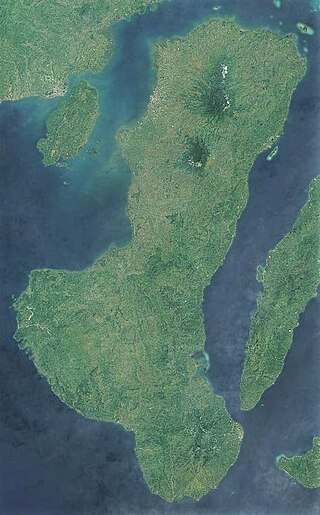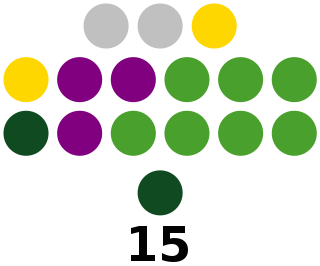
Negros Oriental, officially the Province of Negros Oriental, is a province in the Philippines located in the Negros Island Region. Its capital is the city of Dumaguete, one of the two regional centers of Negros Island Region, with the other being Bacolod. It occupies the southeastern half of the large island of Negros, and borders Negros Occidental, which comprises the northwestern half. It also includes Apo Island, a popular dive site for both local and foreign tourists.

Negros Occidental, officially the Province of Negros Occidental, is a province in the Philippines located in the Negros Island Region. Its capital is the city of Bacolod, of which it is geographically situated and grouped under by the Philippine Statistics Authority, but remains politically independent from the provincial government and also one of the two regional centers in Negros Island Region. It occupies the northwestern half of the large island of Negros, and borders Negros Oriental, which comprises the southeastern half. Known as the "Sugarbowl of the Philippines", Negros Occidental produces more than half the nation's sugar output.

Bacolod, officially the City of Bacolod, is a highly urbanized city in the Negros Island Region in the Philippines. With a total of 600,783 inhabitants as of the 2020 census, it is the most populous city in the Negros Island Region and the second most populous city in the entire Visayas after Cebu City.

Cadiz, officially the City of Cadiz, is a component city in the province of Negros Occidental, Philippines. It was the capital of the short-lived province of Negros del Norte, before the creation of the province was declared unconstitutional on August 18, 1986.

Talisay, officially the City of Talisay, is a component city in the province of Negros Occidental, Philippines. According to the 2020 census, it has a population of 108,909 people.

The Panaad Stadium, also sometimes spelled as Pana-ad, named after the park where the stadium is situated in, is a multi-purpose stadium in Barangay Mansilingan, Bacolod, Philippines.

The Negros Revolution, commemorated and popularly known as the Fifth of November or Negros Day, was a political movement that in 1898 created a government on Negros Island in the Philippines, ending Spanish control of the island and paving the way for a republican government run by the Negrense natives. The newly established Negros Republic lasted for approximately three months. American forces landed on the island unopposed on February 2, 1899, ending the island's independence. Negros was then annexed to the Philippine Islands on 20 April 1901.

The Sugar Regulatory Administration is a government-owned and controlled corporation attached to the Department of Agriculture of the Philippines who is responsible for promoting the growth and development of the sugar industry of the Philippines through greater participation of the private sector and to improve the working conditions of the laborers.

The following outline is provided as an overview of and topical guide to the Philippines:

Metro Bacolod is the 8th-most populous and the 6th-most densely populated metropolitan area out of the 12 metropolitan areas in the Philippines. This metropolitan area as defined by the National Economic and Development Authority (NEDA) has an estimated population of 840,170 inhabitants as of the 2020 official census by the Philippine Statistics Authority.
The 2011 PFF National Men's Under-23 Championship is a football tournament in the Philippines organized by the Philippine Football Federation (PFF) and Japanese automaker Suzuki. It is the first of its kind in the country.
A special election for Negros Occidental's 5th district seat in the House of Representatives of the Philippines was on June 2, 2012. The special election was called after incumbent representative Iggy Arroyo died on January 26, 2012. Binalbagan Mayor Alejandro Mirasol defeated Negros Occidental Provincial Board Member Emilio Yulo III in the election.

Negros is the fourth largest and third most populous island in the Philippines, with a total land area of 13,309 km2 (5,139 sq mi). The coastal zone of the southern part of Negros is identified as a site of highest marine biodiversity importance in the Coral Triangle.

The San Carlos Solar Energy Inc. (SaCaSol) I is a 22 megawatt (MW) solar photovoltaic power plant in San Carlos, Negros Occidental. It is currently the largest operational solar plant in the Philippines

The Paglaum Sports Complex is a sports venue in Bacolod, Philippines adjacent to the Negros Occidental High School. It was established during the administration of Governor Alfredo Montelibano Jr. in the 1970s. It hosted three editions of the Palarong Pambansa.

Capitol Central, previously called the Negros Occidental Provincial Capitol Complex, is a government complex and mixed-use estate centered around the Negros Occidental Provincial Capitol, currently co-managed with Ayala Land. Certain portions are leased or sold to Ayala Land, as part of their industrial estate in Bacolod, Philippines.

The Negros Island Region (NIR) is an administrative region in the Philippines. Covering both the islands of Negros and Siquijor, the region is composed of three provinces: Negros Occidental, Negros Oriental, and Siquijor, as well as the highly urbanized city of Bacolod, which is the most populous in the region. The regional centers are Bacolod and Dumaguete.

The Negros Occidental Provincial Board is the Sangguniang Panlalawigan of the Philippine province of Negros Occidental.
ACEN Corporation, the Ayala group’s listed energy platform, is at the forefront of the energy transition, with a rapidly growing presence across the Philippines, Australia, Vietnam, India, Indonesia, Lao PDR, and the USA. The company currently has 6.8 GW of attributable renewable energy capacity spanning operational, under-construction, and committed projects.
Ricardo "Cano" Tan is a Filipino politician, businessman and former sports administrator.
















